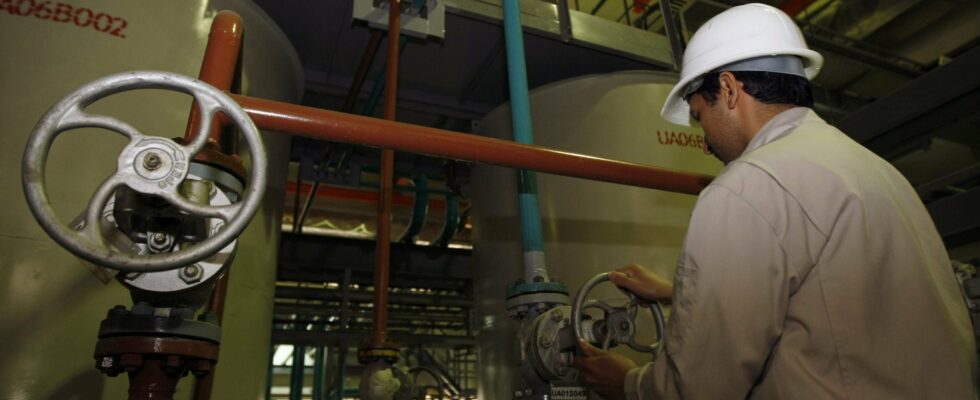The meeting was surrounded by the greatest discretion. Iran, Germany, France and the United Kingdom discussed Tehran’s nuclear program in Geneva this Friday, November 29, against a backdrop of heightened tensions even before Donald Trump’s return to the White House.
The chancelleries of the four countries had not leaked anything about the detailed program of the discussions, nor even about where they were to be held on the shores of Lake Geneva or how long they were to last. A rare degree of discretion.
Following the discussions, a senior Iranian diplomat indicated that Iran, Germany, France and the United Kingdom would “continue their diplomatic dialogue in the near future.” “We are firmly committed to defending the interests of our people and our preference is the path of dialogue and engagement,” Kazem Gharibabadi, Iranian deputy foreign minister, wrote on X, adding that the discussions had been “frank”.
The stakes of the talks were clearly exposed by the British spy chief during a visit to Paris this Friday morning. Iran’s nuclear ambitions pose a major “security threat” to the world, said Richard Moore. “Iran’s allied militias in the Middle East (Hamas and Hezbollah) have suffered serious setbacks. But the regime’s nuclear ambitions continue to threaten us all,” warned the head of MI6, who spoke alongside his French counterpart, the head of the DGSE Nicolas Lerner.
The exchanges via social network, after a first meeting Thursday on the banks of Lake Geneva between Iranian diplomats and the European Union, also gave an idea of the tone of this Friday’s meeting. The number two in European diplomacy, Enrique Mora, spoke on X of a “frank discussion” with Majid Takht-Ravanchi and Kazem Gharibabadi, two deputies of Iranian Foreign Minister Abbas Araghchi. On the Iranian side, we argue that Europe has “failed to be a serious player” on the nuclear issue after the return of American sanctions and we call on the EU to abandon “irresponsible” behavior, particularly concerning the war in Ukraine and Gaza.
Added to the difficult situation of Tehran’s allies is the return to the White House of Donald Trump, architect of a so-called “maximum pressure” policy towards Iran during his first term.
New “advanced” centrifuges
Iran therefore hopes to smooth things over with the Europeans, while showing firmness. In an interview with British daily newspaper The Guardian published Thursday, Abbas Araghchi explained that Iran could acquire nuclear weapons if the Europeans reimposed sanctions.
France, Germany and the United Kingdom, associated with the United States, succeeded in having a resolution adopted within the framework of the International Atomic Energy Agency (IAEA) reproaching Iran for its lack of cooperation on nuclear power.
In response, Tehran announced that it wanted to put new “advanced” centrifuges into service, which the IAEA confirmed in a confidential report of which AFP obtained a copy on Friday. The agency, which monitors Iran’s nuclear program, said Tehran wanted to install some 6,000 new centrifuges to enrich uranium at low levels. “Iran has informed the agency” of its intention to put these machines into service at the Fordo and Natanz sites for an enrichment rate of up to 5%, slightly above the authorized 3.67%. by an international agreement in 2015 but far from the 60% enriched fissile material that Tehran already produces.
This “clearly goes in the wrong direction, Iran makes it appear that it is reacting to a resolution of the board of governors (of the IAEA), but in view of the situation we say that the imperative of the moment for Iran should be de-escalation,” a spokesperson for German Foreign Affairs underlined from Berlin. The Iranians defend the right to nuclear power for civilian purposes and deny wanting to acquire atomic weapons, something of which the West strongly suspects them.
An agreement torn up by Donald Trump
In 2015, Iran concluded an agreement in Vienna with France, Germany, the United Kingdom, China, Russia and the United States to regulate its nuclear program. In return, the text provided for a reduction in international sanctions against Tehran. But in 2018, Donald Trump, who became President of the United States, unilaterally withdrew his country from the agreement – with which Tehran complied, according to the IAEA – and reestablished heavy sanctions against Iran.
In retaliation, Tehran significantly increased its reserves of enriched uranium and increased the level of enrichment to 60%, close to the 90% needed to produce an atomic weapon.
